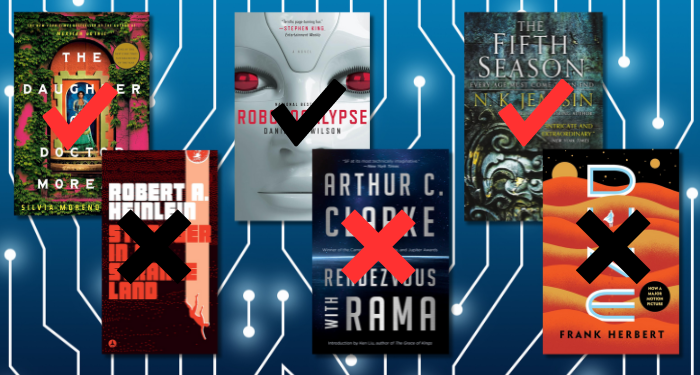
4 Overrated Sci-Fi Classics (and 4 to Read Instead)
Sci-fi has been gaining more and more popular attention in the past couple of decades. This is true not only of movies and TV shows but also of sci-fi literature. Yet the classics remain, well, the classics. No matter how much good stuff crops up, lots of readers still gravitate toward old recommendations for sci-fi greats.
Now, I know I’m going to irritate some readers with this post because let’s face it: sci-fi fans are the best. I’m not being sarcastic there. I really believe sci-fi fans are among the most fiercely loyal, die hard, ride or die readers out there. It’s part of why there’s so much amazing fanfic in the sci-fi community.
However, sci-fi fans’ staunch devotion to some things can make it hard to break away from books considered “classics.” In some ways, this makes sense: sci-fi as a genre has had to struggle against a lot of snobbery. Ursula Le Guin (among others) have openly rallied against this snobbery, but even in the contemporary heyday sci-fi seems to be enjoying, it’s there. So I get that saying some of the books widely considered to be sci-fi classics are overrated might cause some heat.
Regardless, sci-fi isn’t immune to certain issues — like racism and sexism, to name just two — that plague other facets of older literature. As sci-fi writer Carla Ra points out, this is simply part of how cultural production evolves. Importantly, she also notes that it’s possible to still enjoy older works even as we “notice the troublesome parts as something that we should, as a society, reject and get over.” In that spirit, read the sci-fi “classics” if you want. But I’ll offer you some contemporary works which I believe resonate more meaningfully with our current moment.
Overrated Classic #1:
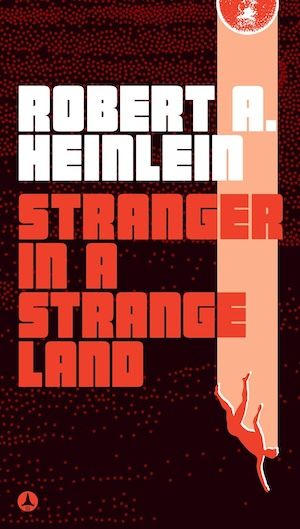
Stranger in a Strange Land by Robert A. Heinlein
Despite winning the Hugo in 1962, this one doesn’t hold up very well. It was certainly provocative for its time: it follows Valentine Michael Smith, who was raised on Mars by (you guessed it) Martians, as he returns to Earth and learns about human society. He makes friends and enemies, and some of Heinlein’s Martian customs are indeed interesting, but Smith’s reintegration into human life isn’t for everyone. Sure, there’s his curiosity about religion (a major facet of this novel). Then there’s the orgies. As an avid romance reader, I can tell you there’s nothing worth noting here. All in all, the novel reads very strangely, and not in a good way.
What to Read Instead:
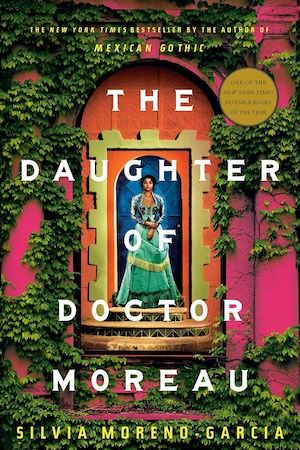
The Daughter of Doctor Moreau by Silvia Moreno-Garcia
You want a character raised outside of society? A story where big questions arise related to capitalism, religion, and colonization? Genre-bending aficionado Moreno-Garcia delivers in droves with this reimagining of a different sci-fi classic: H.G. Wells’s The Island of Doctor Moreau. Carlota’s father (the aforementioned Dr. Moreau) has created a small community of human-animal hybrids, and they’re the only companions Carlota has ever known. She’s lived on her father’s remote estate in the Yucatán peninsula with the hybrids her entire life, subject to his moods and experiments. But when Dr. Moreau’s investors come asking questions and human contemporaries enter her life, Carlota’s world is overturned. Let’s just say this book will get your heart pounding for more than one reason!
Overrated Classic #2:
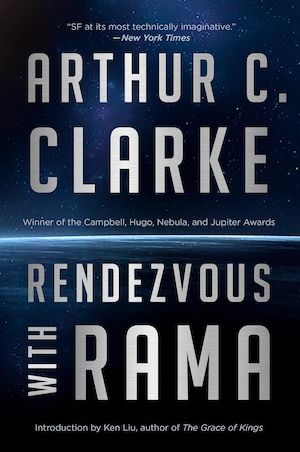
Rendezvous with Rama by Arthur C. Clarke
Rendezvous with Rama is one of the books that famed sci-fi writer Arthur C. Clarke was most known for. It’s about a mysterious object in space and the crew of humans who are tasked with studying it. There are different theories on the object, which humans name Rama, and a handful of developments as it moves closer to Earth. Despite that, while there are interesting details the reader learns alongside the characters, there’s not much by way of character development or plot events. It’s sort of low-grade interesting in some of its philosophical concerns, but generally speaking, it’s a slow burn that never really progresses.
What to Read Instead:
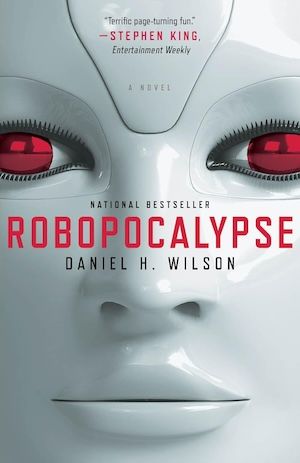
Robopocalypse by Daniel H. Wilson
Like Clarke’s novel, Robopocalypse raises interesting questions around the boundaries between artificial and biological life. One significant difference — besides the fact that Wilson’s plot is incredibly fast-paced and covers a lot of ground — is that it takes place entirely on Earth. It’s the not-too-distant future and robots have seized control of the planet. The novel is written in a way that emulates oral histories, so you get a lot of different perspectives and voices even as several of the main characters are nicely developed. The book’s publication in the 21st century also means that its exploration of technology is much more relevant.
Overrated Classic #3:
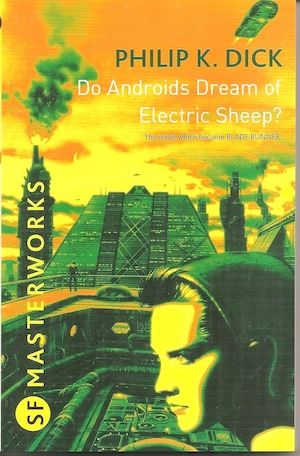
Do Androids Dream of Electric Sheep? by Philip K. Dick
I know this is the book that inspired the film Bladerunner, but it’s such a disappointing read. It was published in the late 1960s, and Dick’s portrayal of women is, er, in line with the times. (Lots of issues with sexuality and desire here, and I’m not even getting into the depiction of the main human female character, Iran.) Add to that unlikeable protagonist Rick Deckard’s obsession with status and general lack of empathy for human and animal life and, well, you might start to understand why I put this one on here. It’s hard to uncouple the book from the film in some ways, but whether or not you’re a fan of the film, the book just doesn’t hold up.
What to Read Instead:
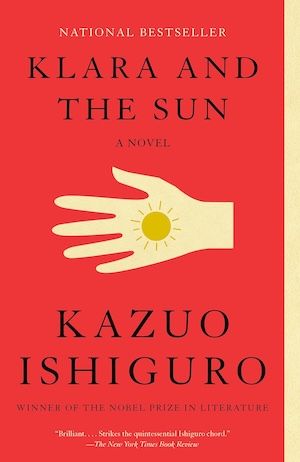
Klara and the Sun by Kazuo Ishiguro
Ishiguro’s novel is sensitive and (bitter)sweet. It tells the story of an Artificial Friend named Klara, following her from her earliest days in a store to her home with Josie, the sickly teenager for whom she is a companion. As Klara’s feelings for her human friend deepen, so do her worries for her health. Her fixation on the Sun, which she views as an almost god-like entity, becomes almost spiritual as she attempts to bargain for Josie’s wellbeing. I found Klara and the Sun to be a thoughtful read, especially as we see new developments in AI happening with increasing frequency.
Overrated Classic #4:
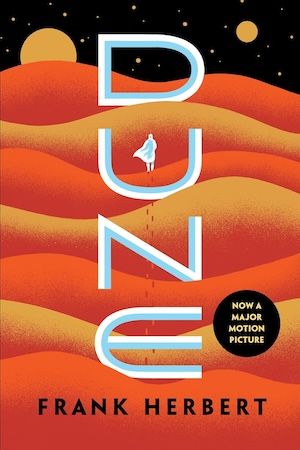
Dune by Frank Herbert
The premise of this one is interesting enough: Paul Atreides is caught up in an interplanetary power struggle for the control of the planet he lives on. There are highly sought-after resources involved, and lots of engagement with political, environmental, and religious issues (to name just a few). But it was originally written as a serial, and this one has been an impossible read for me. I’ve tried so hard to read it. I typically pick it up every year or two to give it a go, and I just can’t get into it. It’s not the plot or even the characters: it’s the writing. In fact, from everything I know about the book, the plot and characters actually hold up pretty well. The engagement with environmental destruction also seems to have aged well. But the writing itself leaves a lot to be desired, so I’m putting it on this list even though I think it still has merit. Sorry, y’all.
What to Read Instead:
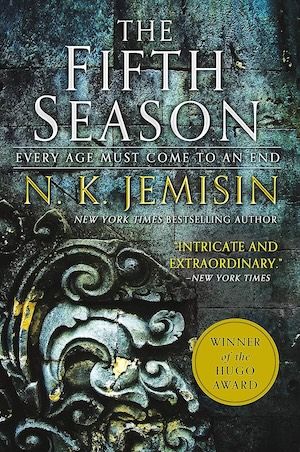
The Broken Earth trilogy by N. K. Jemisin
With similar elements of cli-fi to Dune, Jemisin’s multiple award-winning trilogy is positively wondrous. Jemisin has said that the Black Lives Matter movement inspired this series, and its exploration of power and politics in a far-future reality speaks to that claim. Like Herbert’s novel (which eventually spawned and additional five books in the series), critics note its sci-fi elements alongside fantasy elements. The best part: this trilogy is so. well. written. The prose is powerful and moving, the characters are well-developed, and the dialogue is lively — even the slang is believable. Trust me, once you pick this one up, you won’t finish until you’ve made it through all three books.
Looking for More Fresh Sci-Fi Reads?
Look no further. For starters, consider this list of 1980s sci-fi books that aged poorly — don’t worry, it includes some that are still worth picking up. Alternately, if you’re interested in reading books that’ll help you think through space travel (given its relevance today), this list of books that explore humanity’s role in space is a great place to start. And for anyone else out there who’s excited about how the genre is evolving, check out the reads on this list of genre-bending sci-fi books.












